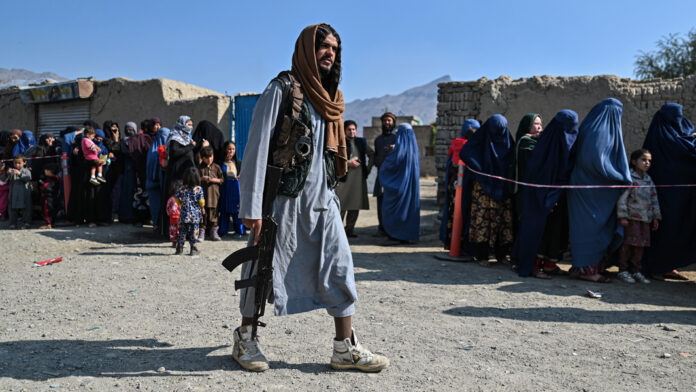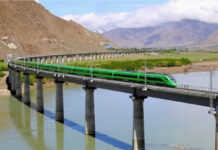“There are decades where nothing happens; and there are weeks where decades happen”-Vladimir Ilyich Lenin. The recent developments in Afghanistan compel to acknowledge this off quoted statement. Juxtaposing the main military dictum of “keeping one leg on the ground” with the current scenario in Afghanistan, the situation is worse off with its “both legs in the air- with no safe place to land”! In the last few months, Taliban in Afghanistan has achieved and undone more than what the United States of America (US) was able to do in the previous two decades.
By Aakriti Vinayak
On August 15, 2021 Taliban captured Kabul leading to an abrupt end and fall of Afghan government. The two decades of progress and nation building saw an unfortunate end as Taliban surged back to power. The reasons for the collapse of Afghan government were many foremost being the American incompetency and the chaotic withdrawal. Other factors were Afghan incapacity, divided leadership and most importantly support provided to the Taliban by Pakistan. Further the so-called “Doha peace process” was big eyewash as it provided legitimacy to the Taliban at the expense of the elected government of President Ghani in Kabul.
The situation in Afghanistan is unparalleled. United Nations (UN) aid agencies has described Afghanistan’s plight as one of the world’s most rapidly growing humanitarian crises. It faces alarming malnutrition crisis and food insecurity. Millions of Afghans are in a dire need of humanitarian assistance. According to United Nations acute hunger in the country rose from 14 million in July to 23 million in March. A World Bank survey also points out that 70% of people are unable to afford food and other basic necessities. UNDP mentions that covid-19; poverty, food insecurity and climate change can bring a situation of near universal poverty in Afghanistan. Further the economy is in dire straits. According to UNDP report, GDP is likely to contract by 20 percent within a year. There is a consequent banking crisis and collapse of financial institutions in Afghanistan. The overlapping crises will be further worsened by the Ukraine Russia conflict. Afghanistan lies at the precipice of disaster.
Further it is important to note that Taliban’s benign mask has gone off, as it remains a brutal repressive regime. Its narrative of a “moderate Taliban” and statements indicating formation of an “inclusive,” administration stands exposed, as it was just done to gain recognition from international community. The grand ideas and messaging that stressed on bringing stability and reconstruction were all superficial, as Taliban has reneged on virtually every promise it made. There has been scathing reports of escalating violence, gross human rights violations and retributive and ethnic killings. Women rights remain under danger as Taliban continues with its restrictive policies. The relentless efforts to efface women and girls from everyday life in Afghanistan have only multiplied one year since the Taliban took over the government on Aug. 15, 2021.
On the critical issue of education, women are suppressed of their rights. Though Taliban gave hints that women will be provided with education within Islamic framework, no progress has been achieved on this front. Further minorities are facing the brunt of the repressive regime. Under the Taliban, Afghanistan has become aggressively hostile to the non-Pashtun ethnic communities, Hazaras and Tajiks. Hazara communities in Afghanistan are being attacked in violent attacks by the Islamic State Khorasan Province (ISKP), Islamic State’s affiliate in Afghanistan. A report by Human Rights Watch (HRW) points out that there have been 13 attacks in past year killing 700 people. Human Rights Watch also in the report has also blamed the Taliban for not doing enough to protect Hazara and other religious minorities from suicide bombings and deadly attacks.
It further added that the victims and their families have not received basic medical care and assistance, though Taliban pledged they would be providing the same when they took power in August 2021 . There is no end to tragedy for Afghan minorities as on September 30, 2022, a suicide attack inside the Kaaj Educational Center in the Dasht-e-Barchi district of West Kabul killed 35 girls and young women . It needs to be highlighted that they belonged to the Hazara community.
On the terrorism front ISK (Islamic State-Khorasan) and al-Qaeda is on rise again. In fact since the Taliban took over the control the ISKs numbers have increased from 2,000 to 4,000 . The killing of al-Zawahiri in a drone strike in Kabul raises question on Taliban and the violation of Doha agreement. In the Doha agreement the Taliban pledged to prevent territory under its control from being used by terrorist groups and to enter into negotiations with the Afghan government.
Taliban after taking control of Kabul is also facing identity crisis and internal conflict between its various factions. The fragmented structure of the Taliban and its various affiliates jockeying of power is a major governance challenge. However it is also important to note that resistance in Afghanistan cannot be completely ruled out as resistance groups comprising former opponents of the Taliban, are gearing up. Some of the groups include Supreme Council of National Resistance for the Salvation of Afghanistan, National Resistance Front of Afghanistan, Tehreek-e-Azadi Afghanistan and Afghan Islamic National and Liberation Movement. However, it remains to be seen how serious this challenge is for Taliban.
Further, Taliban is yet to secure recognition from the international community. Though the regional powers like, Iran, Russia, Uzbekistan and Tajikistan and India have started interacting with the Taliban regime, Taliban is unable to mitigate the apprehensions and reservations of these regional powers. In fact, it is pertinent to note that there is increasing mistrust between Pakistan and Afghanistan. There are simmering tensions between Afghanistan and Pakistan on the Durand line. There have been recurring reports of firing and clashes between the security forces of the two countries at the border. Pakistan triumphalism was short lived as Taliban instead of providing any strategic advantage has become worrisome factor for Pakistan’s security. The rise of Tehreek-i-Taliban Pakistan, or TTP and Kabul support for it has led to differences between the two countries. Pakistan has been seeking support from Afghan Taliban to crackdown on TTP, however Afghan Taliban mediated talks between Pakistan and TTP, which led to the release of dozens of TTP prisoners in Pakistan is causing a further stress in the ties between the two countries.
For India, the change of regime in Afghanistan poses a long-term challenge. India should prepare accordingly as the ripple effects in the form of rise of terrorism and radicalism is expected. Importantly it will majorly impact the internal security situation in India. The fallout could be particularly felt in Jammu and Kashmir, Punjab and the hinterland. However, India and Afghanistan share a civilizational connect and it has provided solidarity and aid. India’s approach towards Afghanistan has been people centric. In an important development on August 15, 2022, Indian embassy in Kabul resumed the operations. The opening of embassy happened after a year of suspension of diplomatic ties. Though India has been at the forefront in providing humanitarian assistance to Afghanistan by supplying a consignment of 50,000 tonnes of wheat and also sending Covid-19 vaccines . India is unlikely to recognize a government in Kabul led by the Taliban unless it meets international requirements of an inclusive government and allows girls to go to schools and women to work.
The gargantuan task lies ahead for Taliban as the country is failing to cope up with new shocks. While the world attention and aid money have been shifted on the crisis in Ukraine, Afghanistan is on the brink of collapse. The future remains mired in uncertainties. Will Taliban government last? Can Taliban save Afghanistan from a humanitarian disaster, economic collapse and financial bankruptcy? Can Afghanistan go back to the previous set up as the successive governments in Kabul were plagued with massive corruption? Is a political consensus possible? These complex questions remain to be answered.
This article first appeared in www.vifindia.org and it belongs to them.








